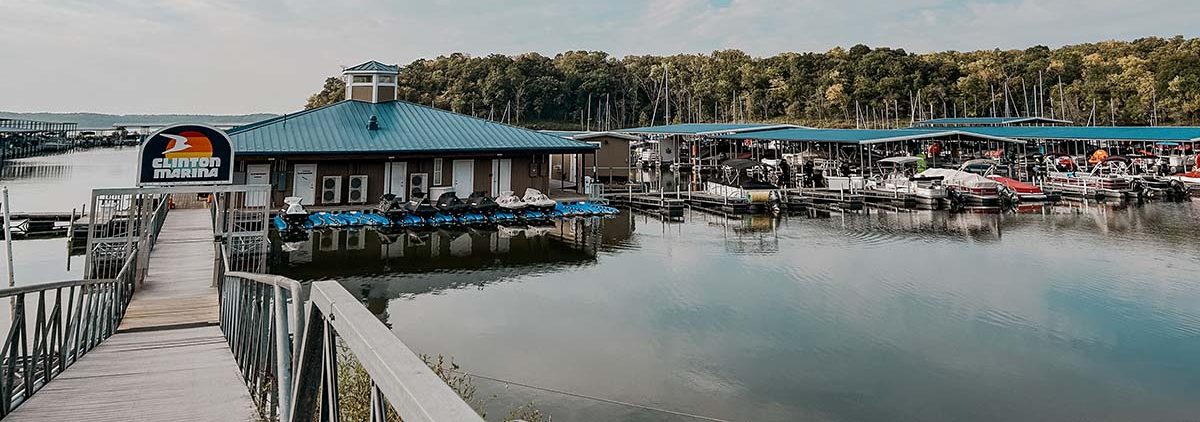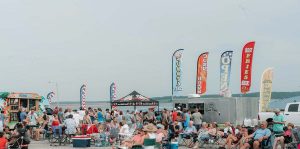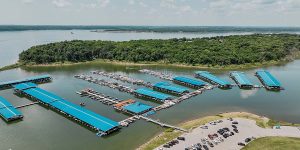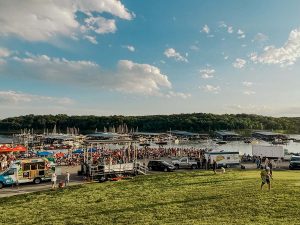
Reimagining a Mom and Pop Marina
Published on January 13, 2025The winner of the Marina of the Year-large facility can be described by the word “persistence.” From major renovations and reimagining staff training, to recovering from a major disaster, the team at Clinton Marina on Clinton Lake in Kansas doesn’t know how to say no. That can-do attitude has helped transform a sleepy, 100-slip sailing marina that opened in the 1970s into a boating hot spot that houses 700 diverse boats.
Erin Meiusi had worked at the marina in high school but moved away to chase other dreams. After life in the corporate world, she and husband Peter Meiusi decided to turn to work that made a visible difference, and the Kansas waterfront pulled them in. They took over the location in 2020 from Erin’s aunt, who had owned the marina for 23 years. The duo fully relied on the 20-year experience of dockmaster Travis Andregg as they set out to turn the marina into a community centerpiece.
“The marina space checked the boxes. We’re outdoor people, and we saw a trend in marinas that were changing from mom and pop to institutional, and we wanted to jump while we could,” Peter said. “I worked for a corporation and wanted to go small and see the results of our work.”
They hit the ground running, pulling ideas from employees, customers, their own travels and events. During the Docks Expo two years ago, they developed their mission statement, “To enhance the overall lake experience for our community,” and it stuck. They added their values of continuous improvement, community, customer service, stewardship, safety and profitability, all of which they work on every day.

One-of-a-Kind Renovations
While Clinton Marina was functional with a steady clientele, Erin and Peter had a vision to make it more of a community gathering space that was a bit out of the ordinary. They added furniture from Bali and customized benches with the marina’s logo as the drain holes in the cup holders. They built nine custom floating restrooms, each featuring a collage of different scenes from old-school sunscreen ads to jet skis. “We felt that even though it’s a restroom, it’s a place that everyone ends up at. It’s a touchpoint that we wanted to nail, so we spent over a year designing it,” Erin said.
With help from Kansas University, they curated a new floating patio, complete with a beer garden and stage. In the boating season, customers can attend weekly live music events and sunrise yoga or the once-a-month “Float Local Friday” that caters to neighborhood and boating families with bounce houses, mini golf, music, food carts and beer tents. Slipholder parties run into the fall, when they haul in a large-screen TV for Kansas City Chiefs game. “We always want to go for the ooh and aah factor, to give people that “wow” at the end of their visit,” Travis said.
While the wow factor guides them, the team at Clinton Marina also looks toward practicality and technology. Dry storage was expanded to 50,000 square feet, and they started their own boat club. Recognizing that boating for many means paddle sports, a new self-service kayak and paddle board vending kiosk was added, with assistance from a Kansas Tourism Grant, so the public can access a boat at any time, and no additional staff time is required.
Peter spent 18 months designing a solar-powered, 70-slip covered dock. “I

looked at boathouses of similar size and monitored the power usage on busy weekends. Then I worked with an engineer and electrician to find the maximum sustainable load. We keep the battery array in a shipping container. We’re completely energy independent,” he said, further commenting that he believes this dock is the first of its size to be solar-powered. The project was partially funded through a REAP grant.
The solar-powered dock proved its worth when a July microburst hit with 85 mph winds that dragged the dock anchors 30 feet, disconnecting them from the land. “It moved every covered and roofed dock and the buildings. It dislodged the main walkway from the parking lot, so we had to use a boat to get to the dock. The marina was a floating island,” Andregg said. However, the solar dock retained power.
The marina crew worked around the clock, opening a baseline of operations within just three weeks, and it was nearly back to running in six weeks. They brought in about 15 contractors and 30 seasonal staff.
Despite all the recovery work at the marina, the customers’ needs were always addressed. “We made sure the customers still had access to their boats, which had minimal damage. We had a shuttle from the land to the docks so they could still get out on the water,” Erin said. A Float Local Friday had been planned for just two days after the storm hit, and while the first reaction was to cancel, upon further thought they decided to go ahead and throw a party. “We live in the community, and when we were out and about, people would come tell us they couldn’t believe what we were able to do. They would buy us drinks and dinner in thanks for letting them get back on their boats,” Andregg said.
Training Philosophy
Securing a team that’s willing to put in extra hours doesn’t come by chance. Training and communication are top priorities. Seasonal staff are mostly students whom Erin said may not know what career they want to explore, so they are offered the opportunity to develop other skills on the lake. They may attend leadership training events or work in administration or accounting. “We work to connect our staff with customers in an industry they might be interested in,” Erin said. “They sometimes end up getting internships, but even if they don’t, they have someone they can talk to who could be a mentor.”

To help attract and maintain managers, training is custom-tailored to the person. As an example, Peter said a high school student worked for them one summer and decided she wanted to stay at the marina instead of pursuing college. “We could give her on-the-job skills but wanted to do more to bolster her knowledge, so we created a book club for her. We gave her eight books to read, and then we’d sit down and talk about what she learned. When she finished all the books, we bought her a plane ticket to Costa Rica, which also gave her a personal development opportunity outside of the workplace,” Peter explained.
Beyond specific training, there is also an annual managers’ retreat that includes either a conference or tours of area marinas, as well as plenty of time to reflect on what worked over the past year and outline goals for the next year. In 2023, the group spent four days at Table Rock Lake in Missouri.
The efforts to restore and turn the marina into a social hub and not just boat storage have paid off with less than 2% turnover in the 700 slips last year. “It’s a strong indication that people are enjoying their time at the marina. We listen to the feedback from our customers, and they take just as much pride in the marina as we do,” Erin said. “We sweat the small stuff and have really thought out all of the improvements we’ve made.”
Following their years of hard work, the team plans to polish what they’ve already done instead of starting any new big projects. The goal is always how to make the marina better for employees and customers.
“Kansas is referred to as a flyover state, but we’re proud of what we accomplished and feel we’re on the leading edge. We eat, sleep, and breathe the marina,” Peter said, offering that winning the Marina of the Year award, after three attempts, validates all their hard work.
| Categories | |
| Tags |






